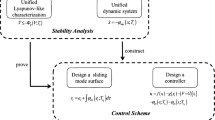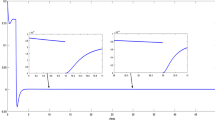Abstract
This paper investigates the distributed leaderless consensus problem of networked Markov jump multi-agent systems with mode-dependent switching topologies. Specifically, a novel mode-dependent sampling and event-triggered communication strategy is proposed to reduce the network burden with less conservatism. Based on model transformation and constructing the mode-dependent Lyapunov-Krasovskii functional, sufficient consensus criteria are first established. Then, the desired event triggering function parameters and the controller gains are designed in terms of linear matrix inequalities (LMIs). In the end, an illustrative example is provided to verify the effectiveness of our proposed consensus method.







Similar content being viewed by others
References
Ren W, Beard RW (2005) Consensus seeking in multiagent systems under dynamically changing interaction topologies. IEEE Trans Autom Control 50(5):655–661
Tian YP, Liu CL (2008) Consensus of multi-agent systems with diverse input and communication delays. IEEE Trans Autom Control 53(9):2122–2128
Hong Y, Hu J, Gao L (2006) Tracking control for multi-agent consensus with an active leader and variable topology. Automatica 42(7):1177–1182
Yu W, Zheng WX, Chen G, Ren W, Cao J (2011) Second-order consensus in multi-agent dynamical systems with sampled position data. Automatica 47(7):1496–1503
Ahmed NR, Cortes J, Martinez S (2016) Distributed control and estimation of robotic vehicle networks: An overview of part 2. IEEE Control Syst Mag 36(4):18–21
Yin X, Liu J (2017) Distributed moving horizon state estimation of two-time-scale nonlinear systems. Automatica 79:152–161
Nedic A, Ozdaglar A, Parrilo PA (2010) Constrained consensus and optimization in multi-agent networks. IEEE Trans Autom Control 55(4):922–938
Lin P, Jia Y (2009) Consensus of second-order discrete-time multi-agent systems with nonuniform time-delays and dynamically changing topologies. Automatica 45(9):2154–2158
Xiao F, Wang L (2008) Asynchronous consensus in continuous-time multi-agent systems with switching topology and time-varying delays. IEEE Trans Autom Control 53(8):1804–1816
Kim H, Shim H, Seo JH (2011) Output consensus of heterogeneous uncertain linear multi-agent systems. IEEE Trans Autom Control 56(1):200–206
Ma C, Shi P, Zhao X, Zeng Q (2015) Consensus of Euler-Lagrange systems networked by sampled-data information with probabilistic time delays. IEEE Transactions on Cybernetics 45(6):1126–1133
Olfati-Saber R, Murray RM (2004) Consensus problems in networks of agents with switching topology and time-delays. IEEE Trans Autom Control 49(9):1520–1533
Ni W, Cheng D (2010) Leader-following consensus of multi-agent systems under fixed and switching topologies. Syst Control Lett 59(3-4):209–217
Sun YG, Wang L, Xie G (2008) Average consensus in networks of dynamic agents with switching topologies and multiple time-varying delays. Syst Control Lett 57(2):175–183
Wen G, Duan Z, Chen G, Yu W (2014) Consensus tracking of multi-agent systems with Lipschitz-type node dynamics and switching topologies. IEEE Trans Circuits Syst Regul Pap 61(2):499–511
Yin X, Li Z, Zhang L, Han M (2018) Distributed state estimation of sensor-network systems subject to Markovian channel switching with application to a chemical process. IEEE Trans Syst Man Cybern Syst Hum 48 (6):864–874
Zhu Y, Zhong Z, Basin MV, Zhou D (2018) A descriptor system approach to stability and stabilization of discrete-time switched PWA systems. IEEE Trans Autom Control 63(10):3456– 3463
Zhu Y, Zhong Z, Zheng WX, Zhou D (2018) HMM-based H∞ filtering for discrete-time Markov jump LPV systems over unreliable communication channels. IEEE Trans Syst Man Cybern Syst Hum 48(12):2035–2046
Zhang L, Zhu Y, Zheng WX (2017) State estimation of discrete-time switched neural networks with multiple communication channels. IEEE Transactions on Cybernetics 47(4):1028–1040
Zhu Y, Zhang L, Zheng WX (2016) Distributed H∞ filtering for a class of discrete-time Markov jump lur’e systems with redundant channels. IEEE Trans Ind Electron 63(3):1876–1885
Wang BC, Zhang JF (2013) Distributed output feedback control of Markov jump multi-agent systems. Automatica 49(5):1397– 1402
Sakthivel R, Sakthivel R, Kaviarasan B, Alzahrani F (2018) Leader-following exponential consensus of input saturated stochastic multi-agent systems with Markov jump parameters. Neurocomputing 287:84–92
Zhang W, Branicky MS, Phillips SM (2001) Stability of networked control systems. IEEE Control Syst Mag 21(1):84–99
Zhang L, Gao H, Kaynak O (2013) Network-induced constraints in networked control systems–A survey. IEEE Trans Ind Inf 9(1):403–416
Fawzi H, Tabuada P, Diggavi S (2014) Secure estimation and control for cyber-physical systems under adversarial attacks. IEEE Trans Autom Control 59(6):1454–1467
Wan J, Yan H, Suo H, Li F (2011) Advances in cyber-physical systems research. KSII Transactions on Internet & Information Systems 5(11):1891–1907
Dimarogonas DV, Frazzoli E, Johansson KH (2012) Distributed event-triggered control for multi-agent systems. IEEE Trans Autom Control 57(5):1291–1297
Mazo M, Tabuada P (2011) Decentralized event-triggered control over wireless sensor/actuator networks. IEEE Trans Autom Control 56(10):2456–2461
Guo G, Ding L, Han QL (2014) A distributed event-triggered transmission strategy for sampled-data consensus of multi-agent systems. Automatica 50(5):1489–1496
Zhang XM, Han QL (2014) Event-triggered dynamic output feedback control for networked control systems. IET Control Theory Appl 8(4):226–234
Dai J, Guo G (2018) Event-triggered leader-following consensus for multi-agent systems with semi-Markov switching topologies. Inform Sci 459:290–301
Pei Y, Sun J (2015) Consensus of discrete-time linear multi-agent systems with Markov switching topologies and time-delay. Neurocomputing 151:776–781
Wang Y, Cheng L, Ren W, Hou ZG, Tan M (2015) Seeking consensus in networks of linear agents: communication noises and Markovian switching topologies. IEEE Trans Autom Control 60(5):1374–1379
Gu K, Niculescu SI (2003) Survey on recent results in the stability and control of time-delay systems. J Dyn Syst Meas Control 125(2):158–165
Acknowledgements
This work was supported by the National Natural Science Foundation of China under Grant 61703038 and 61627808.
Author information
Authors and Affiliations
Corresponding author
Ethics declarations
Conflict of interests
The authors declare that they have no conflict of interest.
Additional information
Publisher’s note
Springer Nature remains neutral with regard to jurisdictional claims in published maps and institutional affiliations.
This article is part of the Topical Collection: Special Issue on Networked Cyber-Physical Systems
Guest Editors: Heng Zhang, Mohammed Chadli, Zhiguo Shi, Yanzheng Zhu, and Zhaojian Li
Rights and permissions
About this article
Cite this article
Ma, C., Kang, E. Distributed consensus of networked markov jump multi-agent systems with mode-dependent event-triggered communications and switching topologies. Peer-to-Peer Netw. Appl. 12, 1753–1760 (2019). https://doi.org/10.1007/s12083-019-00754-y
Received:
Accepted:
Published:
Issue Date:
DOI: https://doi.org/10.1007/s12083-019-00754-y




